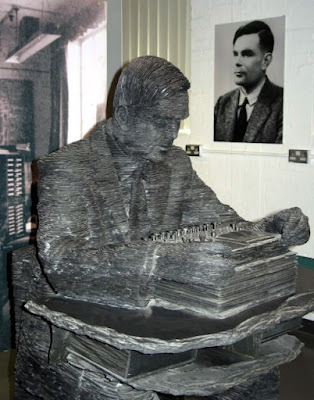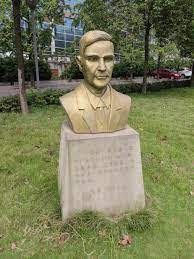Alan Mathison Turing OBE FRS(1912–1954) was a logician and mathematician from the United Kingdom.
He is known as the "Father of Artificial Intelligence" and "The Father of Computer Science."
Turing
earned a first-class honors degree in mathematics from King's College,
Cambridge, in 1934.
Turing received his PhD from Princeton University after a
fellowship at King's College, where he studied under American mathematician
Alonzo Church.
Turing wrote numerous important publications during his
studies, including "On Computable Numbers, with an Application to the
Entscheidungsproblem," which proved that the so-called "decision
problem" had no solution.
The decision issue asks if there is a method for determining
the correctness of any assertion inside a mathematical system.
This paper also explored a hypothetical Turing machine
(basically an early computer) that, if represented by an algorithm, could
execute any mathematical operation.
Turing is best known for his codebreaking work at Bletchley Park's Government Code and Cypher School (GC&CS) during World War II (1939–1945).
Turing's work at GC&CS included heading Hut 8, which was
tasked with cracking the German Enigma and other very difficult naval
encryption.
Turing's work undoubtedly shortened the war by years, saving
millions of lives, but it is hard to measure with precision.
Turing wrote "The Applications of Probability to
Cryptography" and "Paper on Statistics of Repetitions" during
his tenure at GC&CS, both of which were held secret for seventy years by
the Government Communications Headquarters (GCHQ) until being given to the UK
National Archives in 2012.
Following WWII, Turing enrolled at the Victoria University
of Manchester to study mathematical biology while continuing his work in
mathematics, stored-program digital computers, and artificial intelligence.
Turing's 1950 paper "Computing Machinery and
Intelligence" looked into artificial intelligence and introduced the
concept of the Imitation Game (also known as the Turing Test), in which a human
judge uses a set of written questions and responses to try to distinguish
between a computer program and a human.
If the computer program imitates a person to the point that
the human judge cannot discern the difference between the computer program's
and the human's replies, the program has passed the test, indicating that it is
capable of intelligent reasoning.
Turochamp, a chess program written by Turing and his colleague D.G. Champernowne, was meant to be executed by a computer, but no machine with adequate capacity existed to test the program.
Turing instead manually ran the algorithms to test the
software.
Turing was well-recognized during his lifetime, despite the
fact that most of his work remained secret until after his death.
Turing was made a Fellow of the Royal Society in 1951 and was awarded to the Order of the British Empire in 1946.(FRS).
The Turing Award, named after him, is given annually by the
Association for Computing Machinery for contributions to the area of computing.
The Turing Award, which comes with a $1 million reward, is
commonly recognized as the Nobel Prize of Computing.
Turing was outspoken about his sexuality at a period when homosexuality was still illegal in the United Kingdom.
Turing was accused in 1952 under Section 11 of the Criminal Law Amendment Act 1885 with "gross indecency."
Turing was found
guilty, granted probation, and was sentenced to a year of "chemical
castration," in which he was injected with synthetic estrogen.
Turing's conviction had an influence on his career as well.
His security clearance was withdrawn, and he was compelled
to stop working for the GCHQ as a cryptographer.
Following successful campaigning for an apology and pardon,
the British government passed the Alan Turing bill in 2016, which
retrospectively pardoned hundreds of persons imprisoned under Section 11 and
other historical laws.
In 1954, Turing died of cyanide poisoning.
Turing's death may have been caused by inadvertent
inhalation of cyanide vapors, despite the fact that it was officially
considered a suicide.
Find Jai on Twitter | LinkedIn | Instagram
You may also want to read more about Artificial Intelligence here.
See also:
Chatbots and Loebner Prize; General and Narrow AI; Moral Turing Test; Turing Test.
References And Further Reading
Hodges, Andrew. 2004. “Turing, Alan Mathison (1912–1954).” In Oxford Dictionary of National Biography. https://www.oxforddnb.com/view/10.1093/ref:odnb/9780198614128.001.0001/odnb-9780198614128-e-36578.
Lavington, Simon. 2012. Alan Turing and His Contemporaries: Building the World’s First Computers. Swindon, UK: BCS, The Chartered Institute for IT.
Sharkey, Noel. 2012. “Alan Turing: The Experiment that Shaped Artificial Intelligence.” BBC News, June 21, 2012. https://www.bbc.com/news/technology-18475646.




